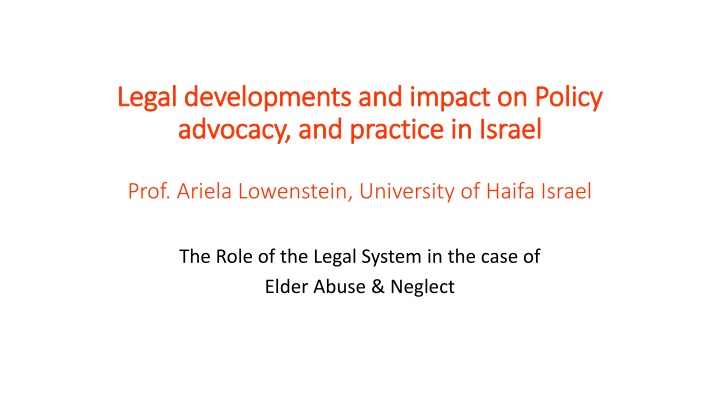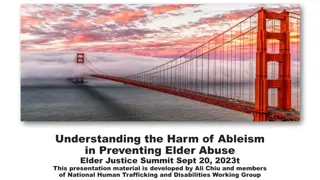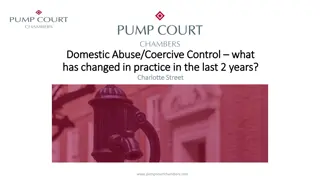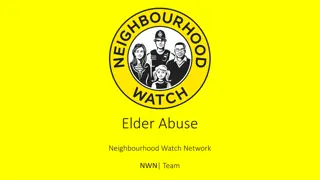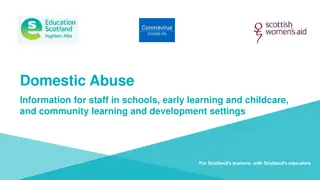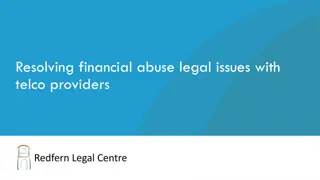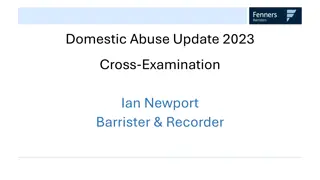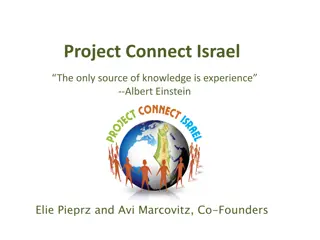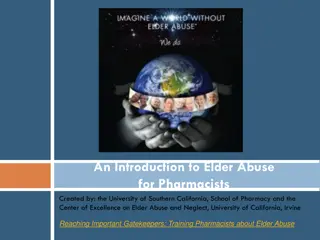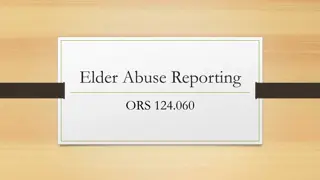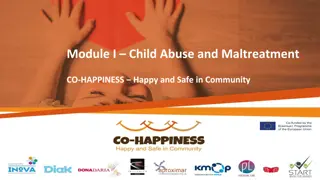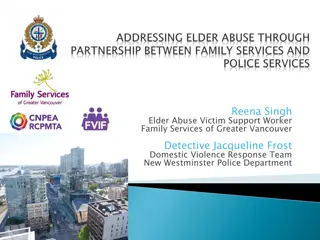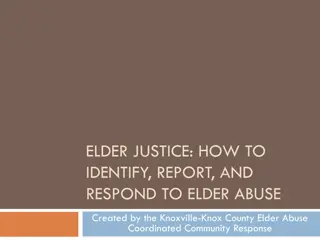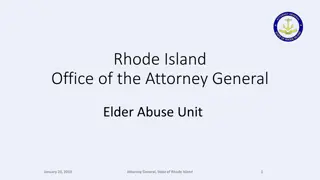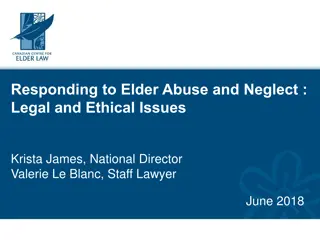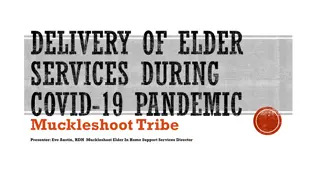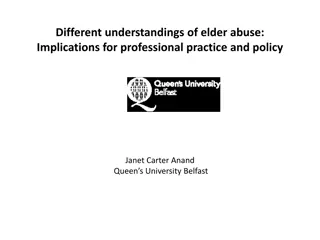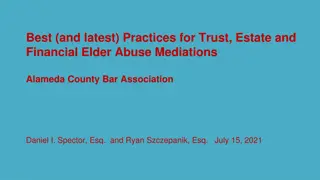Legal Developments Impacting Elder Abuse in Israel
Role of the legal system in combating elder abuse and neglect in Israel, including advocacy efforts, policy developments, and the need for a National Action Plan. Learn about initiatives by organizations like Eshel, the Ministry of Social Welfare, and the Israeli Gerontological Society to address elder abuse issues.
Download Presentation

Please find below an Image/Link to download the presentation.
The content on the website is provided AS IS for your information and personal use only. It may not be sold, licensed, or shared on other websites without obtaining consent from the author.If you encounter any issues during the download, it is possible that the publisher has removed the file from their server.
You are allowed to download the files provided on this website for personal or commercial use, subject to the condition that they are used lawfully. All files are the property of their respective owners.
The content on the website is provided AS IS for your information and personal use only. It may not be sold, licensed, or shared on other websites without obtaining consent from the author.
E N D
Presentation Transcript
Legal developments and impact on Policy Legal developments and impact on Policy advocacy, and practice in Israel advocacy, and practice in Israel Prof. Ariela Lowenstein, University of Haifa Israel The Role of the Legal System in the case of Elder Abuse & Neglect
Charter of Fundamental Rights Article 25 of the Charter of Fundamental Rights, the European Union recognised and respected the rights of older people to lead a life of dignity and independence, and to participate in social and cultural life. Accordingly, the challenge today and for the future will be to tackle the demographic change in an affirmative way
Legal developments and impact on Policy, advocacy, and practice in Israel The main thrust in Israel to deal with Elder Abuse came through advocacy by: -Eshel* -The Ministry of Social Welfare -The Ministry of Health -National Insurance Institute * The Ass. for Planning and Development of Services for the Aged in Israel 3
Needed Action at National Level Elder abuse can only be effectively prevented by action at the appropriate national level Thus, in order to combat abuse, policy action, in the form of a National Action Plan must be drawn Such a plan should include general guidelines and relevant legal bases to be established
A National Plan for Care of the Older Population Currently the Israeli Gerontological Society, with involvement of the chair, Prof. Brick and several members, including Prof. Lowenstein, prepared A National Plan for Care of the Older Population, relating to major issues in the field of aging, including Elder abuse and neglect.
Parliamentary Committee . A special Parliamentary Committee had been established, headed by the vice-chair of the Israeli Parliament. This Parliamentary Committee met bi-weekly and discussed the various issues within the suggested plan. In the area of elder abuse & neglect the following were suggested, focusing on: Prevention, Identification and Treatment
Elder Abuse Awareness The following programs were approved : Acquiring knowledge through National Data Collection Developing community interventions pilot programs Introducing new regulations and protocols in the Healthand Welfare systems Developing new Legislation Establishing a Help Line for EA victims Developing training programs and case materials 7
Legislative Developments Legislative Developments Prior to 2016 Guardianship Law Reform Israel has a rich history of legislative attempts to address the phenomena of elder abuse and neglect It can be summarized as a "legislative-generational" developmental process Invited Chapter. Lowenstein, A. & Doron, I, - Elder Abuse in Israeli Society legislative Acts and Special Services. (ED.) M. Phelan. A book chapter for the book on: Combating Elder Abuse
legislation, policy, research and services legislation, policy, research and services Four "legislative generations Paternalism and social intervention" Introduction of laws during the first years of Israel's existence 1 - The Law of Legal Competence and Guardianship, 1962 9
Legislative Generations 2. Criminal law and mandatory reporting" Mainly a criminal approach New legislation encouraging: awareness, knowledge, training and empowerment of professionals working with abused elders Amendment 26 to the Penal Code, 1989, "Injury to the helpless". Also identified Elders as susceptible to injury 10
Legal Development Mandatory Reporting A major addition (1989) to Criminal Law of 1977 - for first time incorporating a specific reference to EA of minors and "helpless persons" (older persons part of this group); in its various forms (physical, mental & sexual) defined as a unique criminal offence. It introduced, first time, a very broad mandatory reporting mechanism, mandating not only professionals, but any person with reasonable suspicion on EA to report it either to a police or welfare officer.
Legislative Generations Amendment 26 to the Penal Law shows some legislative progress on EA. Thus, the Ministry of Social Welfare developed special courses to train needed welfare officers-senior social workers for the courts 12
A new broad legal approach: family violence laws. A most important outcome - the enactment of Israel s Violence in the Family Law of 1991. For the first time it authorized victims of family violence to access Family Courts in an independent manner, in order to receive protective orders against their predator
Legislative Generations 3. Protection and Therapy within Family Violence" A response to empirical data on family violence and the system s failure to deal with it. The Law for Prevention of Violence in the Family, 1991 - also enables to consider older persons who suffer from family violence man 14
Legislative Generations 4. Amendment 7 of the Law for Prevention of Violence in the Family, 2001, The law emphasizes professionals obligation to provide victims of EA information in order to get help and care. 15
The Generational Development of Israeli The Generational Development of Israeli Legislation Legislation Time Rationale Legal Foci of Statutory Example Elder Specific? Power Gen. 1 1950s- 1960s Social control & Protection of helpless populations Social welfare officers Legal Capacity and Guardianship Law 1962 No part of "helpless populations" Gen. 2 1980s Deterring and punishing + Reporting Police/ Criminal Justice Criminal Law (Amendment), 1989 No part of "helpless populations" Gen. 3 1990s Removal and Treatment The Victims Prevention of Family Violence Law 1991 No part of victims of family violence Gen. 4 2000s Mix: Awareness, Early detection; Social intervention; criminal deterrence; Mix: Older persons & Professionals Ministry of Health Directives 2003-5 Yes
A significant development in Israeli legislation In last 3 years, after political struggle, Israeli Parliament enacted a major law reform - relating to EA & Neglect: in the field of Adult Guardianship Three main elements were included: 1. Establishing a Supportive Decision Making Mechanism as an alternative to Formal Guardianship 2. Establishing Continuing Power of Attorney for property and personal care, as an alternative to formal guardianship 3. Reforming existing guardianship regime to minimize its scope, and transforming it to an option of last resort
Legislative generations The question is: how were legislative developments translated into advocacy, research and practice? 18
Awareness, policy and services A hot-line for elders exposed to abuse was established. The volunteers operating it had been especially trained on EA issues. 19
Identifying and Reporting EA in the Health System The Ministry of Health Director General issued a detailed procedure: A circular states that one of its aims is to increase awareness of EA and neglect phenomenon and to broaden and deepen identification of and care for aged, from the moment that suspicion is aroused... (Clause 2.3). 20
Awareness, policy and services A national committee was created with members from all relevant governmental ministries (welfare, health, police), Academia and NGOs. A National Forum for inter-organizational coordination was created by the Welfare Ministry. 21
Further Needed Steps An integrative approach is needed to create partnerships between the criminal-legal system and the health-welfare systems.
Three main policy issues emerge: 1. What should be the dominant approach: Criminal- Legal or Social ? 2. What types of professional interventions should be further developed and implemented? 3. What should be the division of responsibility between the health and welfare systems? 23
Thank you 24
